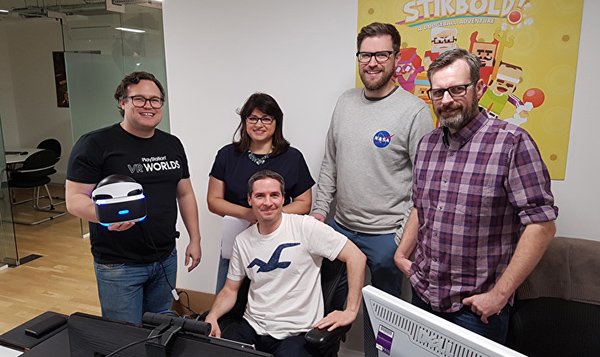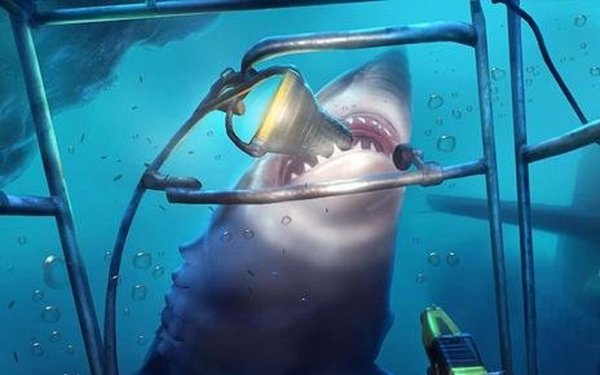Brynley Gibson, head of developer Kuj Studios, encourages developers to take a long-term view and not limit themselves to games in VR and AR technology.

Kuju, a British outsourcing developer, has been working in the VR field as many companies in recent years. Last month, the company announced that media technology in 2017 will be the focus of their attention because of the recent recruitment of Brynley Gibson, the new head of the studio.
Gibson was previously the executive director of PlayStation London Studios. He promoted the development of the technology demonstration to the Morpheus project (note: PSVR predecessor) and then went on the PlayStation VR. These demonstrations form the basis of the latest software "PlayStation VR Worlds" on the PSVR.
Kuju recruited Gibson in August to advance the VR market. However, since this was a big company for Sony, it was not a big deal for the technology.
"I'm not a VR stigma," he said in an interview. "I've been keeping a reasonable amount of skepticism. When I created VR Worlds for PlayStation, I was experimenting and experimenting with VR technology every day. By the end of the project I've Brainwashed by VR.I understand the principle of work, but also to explore the limitations.I have seen hundreds of demos, witnessed the magic of VR technology. Every time people take off the VR helmet, it is a The vice delights, or feels reborn. I now feel like an old smoker and call everyone to suck."
“I am finally convinced that AR and VR technology will completely change people's lives in the future. These technologies can provide some other media technology can not do. VR allows users to instantly transfer from one place to another, but also The function of deep resonance is very special.AR is more powerful and one of its selling points is to provide continuous display of enhancements.Imagine where you go every day with a layer of information to help you complete a variety of tasks. It is the biggest bright spot. These technologies will be integrated into our daily lives and become an integral part of ours."
But other people in this industry are not as optimistic as Gibson. Everyone expected that the year 2016 would be the first year of VR's rise. The result was a terrible mess. Supporters of the technology gradually lost interest in the slow growth of the market. Although the three major commercial equipment - Oculus Rift, HTC Vive and PSVR - sales are still good. The PlayStation and Helmet seem to have the largest number of users, confirming that they have actually sold more than 915,000 units, but this still does not meet the expectations of some VR advocates.
However, Gibson believes that the current consumer slump is a "classical decline after the sale," and believes that sales will become even larger with the expansion of the receiving channel.
“Consumers will eventually accept these products, and the market will also stabilize,†he said. “The sales of VR systems on the mainframe and PC are actually not too far from what we expected. Mobile sales seem to be good, too. It is also accelerating. Within ten years, we will really realize the application, and there will be enough consumers to support the market. As we move in that direction, many things will change and the momentum will naturally emerge."

“Commercial applications are steadily increasing, and it will also help guide consumers into VR. This will make technology look approachable and promote its excellence. Platform managers can also continue to find new ways to stimulate demand. All we need to do is to create a comprehensive experience."
"Over the next decade, VR technology, content, and developers' capabilities will all improve. What we are seeing is still very primitive. The application of these technologies will gradually become commonplace. Way into VR It will be easier to use. The price will be lower and the appearance will be improved. The experience at all levels will improve. The direction of development is still right. To create a new market, time is the key."
Gibson emphasized that this does not mean that all developers should invest heavily in VR. At the same time traditional media technologies will still be the main force. However, it is also acceptable for big companies like Kuju to prepare for the future market.
“New technologies and new platforms will continue to be launched, and we want to be prepared for them,†Gibson said. “Nintendo Switch is a good example; although this is not VR technology, it is worth investing in it. VR and AR technology only However, it is a small part of our strategy."
"Companies that don't do software development should study how to integrate VR and AR technologies into their own businesses. They will use those software to design new ways of operating, whether it's internal employee training or development for the public."
VR helmets are generally not installed in people's bedrooms, and many developers ignore this. However, VR technology is increasingly being used elsewhere in the industry, not limited to home use. This gives developers a lot of opportunity to seize this technology and not have to worry about it every day, thinking about how to win the public's interest.
“Home VR consumers are only part of the future,†Gibson emphasized. “Companies should pay attention to where else to use VR technology, and how they are used and under what circumstances. This will allow us to see a more The vast market is not limited to the home market. VR projects are now available in almost all industries - fashion, engineering, defense, etc. Entertainment is only one of its uses; there are other educational and training purposes."
“We have seen this technology already used in public facilities such as museums. There have been major successes in China's VR experience stores, which should also be possible. The bigger the vision, the bigger the market.â€
"If you are providing content for the public market, then you can only tailor the market size. For those independent developers, the software must be made cross-platform. It is also wise to get financial support from partners already involved in the VR industry. ."
However, it is still possible to feel that even the largest company in the VR industry will lose confidence because the product is not sold smoothly. Gibson's old club PlayStation made layoffs in the London studio before the PSVR came online. This may mean that some companies have invested too much in the VR industry, and now have to reluctantly cut off? Gibson does not think so.
"Of course, dissolving a good team is really hard to tell, but it's not surprising," he said. "At the end of many large projects, team layoffs will be done. This is part of the game development cycle, VR, No exception."
He is still very confident that future VR developers, especially non-gaming developers, will face increasing demands. His new team at Kuju is now recruiting.
“This market is still dusty,†said Gibson. “Our strategic focus is on brands and licenses. Some of our users are reluctant to experience AR and VR. Our mission is to introduce them to the potential of this media technology. Previously we had some companies. Developed non-VR console games such as "Pokemon", "Risk" and "Zumba Dance." But with these technological advances, this step has also changed. We can create immersive and unprepared sense of input VR experience."
Gibson's experience is mainly in VR technology, Kuju is ready to set up an AR technology team is no use. In both of these technologies, VR is often the protagonist of everyone's discourse - especially in the game industry - but Gibson insists that the demand for AR technology is also growing.
"The two technologies are quite similar but the experience is completely different," he said. "I had the privilege of discovering that the team members were also quite familiar with AR technology. This included the HoloLens and Sony AR projects developed for Vita and PS3. The knowledge and experience are really invaluable for project development."
"We believe that AR technology will occupy the core position of the industry for some time in the future, and we can see great progress in this technology in the next few years. Controversy over VR, AR and MR (Mixed Reality) There is no point in being superior or inferior, because these technologies have their own strengths, and they must not be chosen for one thing and they must be abandoned.Each technology can be developed in their own field. They all have considerable potential. The winner is the consumer."
Organize your cabling
- Organizes all types of cables
- Ideal for network Patch Panel cabling
- Finger duct design allows easy cable organization
- Cable pass-through holes in the back of the duct
- Only set up 1U rack
- Work with threaded, round and square hole racks
- EIA 19" RACK standard compliable
- Including screws and mounting hardware
Metal Cable Management,1U Metal cable management,stainless steel cable management,metal cable tie mount
NINGBO UONICORE ELECTRONICS CO., LTD , https://www.uonicore.com